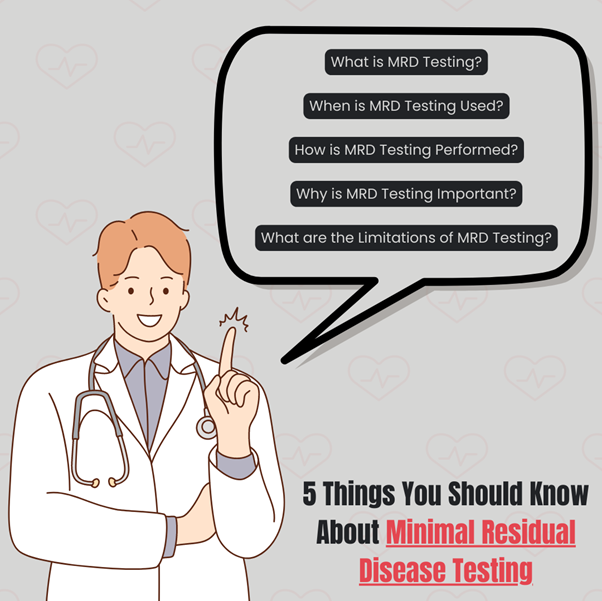
Testing for minimal residual disease (MRD) is a method used in cancer treatment to find any remaining cancer cells, no matter how microscopic, in the body. Here are five aspects of minimal residual disease testing that you should be aware of:
1) What is MRD Testing?
Minimal residual disease testing is a technique used to detect small numbers of cancer cells that may remain in the body after treatment. It involves taking bone marrow or blood and using laboratory techniques to detect and measure the number of cancer cells present.
2) When is MRD Testing Used?
Minimal residual disease testing can help blood cancers treatment such as leukaemia, lymphoma and multiple myeloma. It is used to monitor the response to treatment and to detect any residual cancer cells that may be left in the body after treatment.
3) How is MRD Testing Performed?
Minimal residual disease testing is possible through laboratory techniques such as flow cytometry or polymerase chain reaction (PCR). A sample of bone marrow or blood is taken from the patient and analysed for cancer cells presence. The results are then compared to baseline levels to determine the number of residual cancer cells present.
4) Why is MRD Testing Important?
MRD testing or colon cancer test is essential because it can detect small amounts of cancer cells that may be missed by traditional imaging techniques such as CT scans or X-rays. By detecting residual cancer cells, doctors can monitor the effectiveness of treatment and adjust the treatment plan if necessary to improve outcomes.
5) What are the Limitations of MRD Testing?
Although Minimal residual disease testing is a technique, there are some limitations to its use. MRD testing is only effective in detecting cancer cells in the blood or bone marrow and may not be effective in detecting cancer cells in other body parts. In addition, MRD testing is unsuitable for all types of cancer and may not be necessary in all cases.
Conclusion:
MRD testing is an essential tool in the treatment of blood malignancies that can assist in identifying any remaining cancer cells and tracking the efficacy of the therapy. It is a sensitive method that can pick up cancer cells in minute quantities that conventional imaging methods would miss.
Its application is constrained, though, and it might not always be required. If you have been given a blood cancer diagnosis, discuss with your doctor whether MRD testing is appropriate for you.
Ensure that you get the best healthcare service from Guardant Health AMEA. You can visit their website to learn more about colon cancer test and MRD testing.



